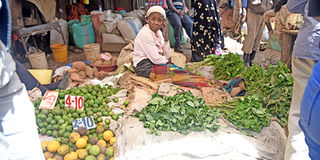Brief news on farming and agribusiness in the country

Traders wait for customers at a market in Nairobi. The practice where farmers grow crops without a market often fuels exploitation by brokers. PHOTO | EVANS HABIL | NMG
What you need to know:
- Tumaini Rubiri Farmers Group secretary Michael Mbaya said their income from potatoes jumped 10 times when they started doing market survey before growing crops.
- Kiruyu/Kathithi Farmers Group chairman Simon Wambua said the practice where farmers grow crops without a market fuels exploitation by brokers.
- Agriculture PS Hamadi Boga said that talks are in top gear within the government to lift the ban in coming months.
- Dr Charles Waturu, the principle researcher on Bt Cotton at Kenya Agricultural and Livestock Research Organisation (Kalro), says the existing ban on GMOs is the only stumbling block to the adoption of Bt cotton.
Smallholder farmers have been asked to embrace market-driven farming to improve their earnings.
The approach involves farmers getting the market first before producing.
Speaking during a field day to highlight successes of the approach at Murera in Igembe Central this week, a coordinator of the Smallholder Horticulture Empowerment and Promotion Project for Local and Up-scaling (Shep plus), which is being spearheaded by Japan International Cooperation Agency and the Ministry of Agriculture, Fransisca Malenge said, the initiative has been embraced by more than 20 countries in Africa, Asia and Latin America.
“Farmers are encouraged to identify and sign contracts with buyers, choose the crop, the crop calendar and use good agricultural practices,” Malenge said.
She said more than 4,000 farmers have been trained in 18 counties.
Tumaini Rubiri Farmers Group secretary Michael Mbaya said their income from potatoes jumped 10 times when they started doing market survey before growing crops.
“Due to assured market, we’ve cut post-harvest losses. We can also access loans from banks because Shep plus recommends farming as a business,” he said.
Kiruyu/Kathithi Farmers Group chairman Simon Wambua said the practice where farmers grow crops without a market fuels exploitation by brokers.
Shep Plus programme chief adviser Nabuhide Hayashi called on agricultural extension officers to embrace the approach to help smallholder farmers boost incomes.
-David Muchui
****
Government considering to lift ban on GMOs, says agriculture PS
The government is considering lifting a ban on genetically modified organisms to allow farmers to grow the much-anticipated Bt Cotton.
Agriculture PS Hamadi Boga said that talks are in top gear within the government to lift the ban in coming months.
The ban was effected in 2012 over safety concerns, riding on research that claimed that genetically modified maize has adverse effect on human health.
“The discussion has been going on and most of the things have crystallised by now. We have the necessary framework in place, we have regulation on how the technology will be applied in accordance with the best practices, and we have a very strong scientific community. As a country, we are at that point where we have to make a decision,” said Prof Boga, who was speaking at the University of Nairobi last week during the national dialogue on GMOs.
Dr Charles Waturu, the principle researcher on Bt Cotton at Kenya Agricultural and Livestock Research Organisation (Kalro), says the existing ban on GMOs is the only stumbling block to the adoption of Bt cotton.
The ban has also interfered with the research on Bt maize, which could be in the market by now, researchers said.
But while many Kenyans are still undecided on whether the country should adopt genetically modified crops or not, chances are that they could be wearing clothes manufactured from genetically engineered lint.
Other than health and environmental safety concerns, Kenyans have also raised fears that the country could lose its food sovereignty to multinational corporations if it adopts GMOs.
-Leopold Obi





